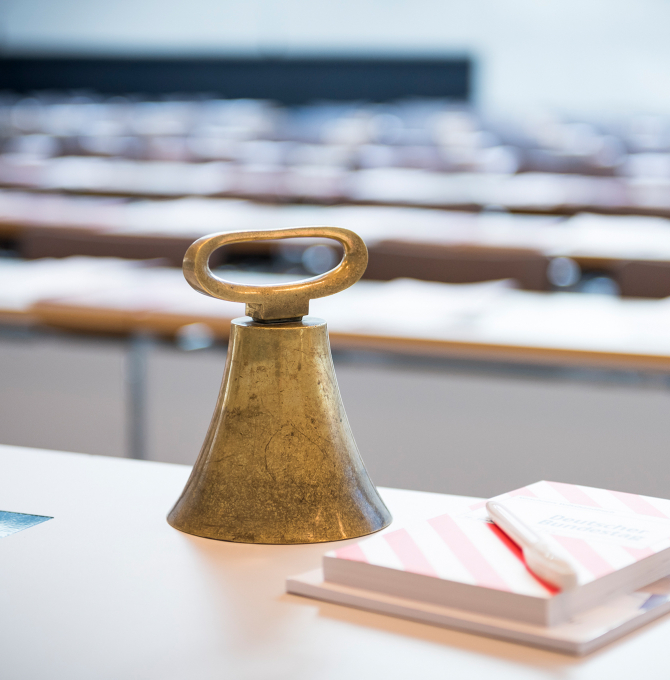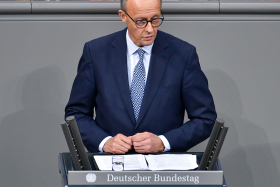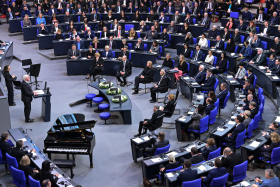
The work of the parliamentary group: internal bodies and meetings
The inner workings of a parliamentary group
• The tension between Members’ independence in exercising their mandate and the need for parliamentary majorities
• Work on draft legislation, initiatives and position papers
• The CDU/CSU joint parliamentary group is unique in the Bundestag
The CDU/CSU parliamentary group is composed of 196 Members of the German Bundestag. Yet the parliamentarians only have political influence if they work closely together. Reaching a common position is often a difficult process, with debates taking place at all levels of the group and in all of its bodies. In the end, the parliamentary group produces joint draft legislation, initiatives and position papers.

Of the 196 Members of the Bundestag who make up the CDU/CSU parliamentary group in the German Bundestag’s 20th electoral term, 152 are members of the Christian Democratic Union (CDU), while 44 belong to the Christian Social Union (CSU). The joint CDU/CSU parliamentary group is unique in the parliamentary system of the Federal Republic of Germany: it brings together the Members of Parliament of two independent parties. This is only possible because the two parties do not compete with each other in any of the Länder (federal states). This has been the case since 1949: while the CSU only stands for election in Bavaria, the CDU is active in all other Länder. The two sides agreed to continue this joint parliamentary group in the 20th electoral term at the group’s constituent meeting, which was held two days after the Bundestag election on 26 September 2021.
How does the parliamentary group operate, and how is it organised? The highest decision-making body is the parliamentary group meeting, which is held once a week – usually on Tuesdays – in weeks when the Bundestag is sitting. This meeting gives the Members of Parliament the opportunity to learn about or express their views on topical issues. They adopt draft legislation and initiatives, and agree on lists of speakers for plenary debates.
At these meetings, the leadership of the parliamentary group can get a sense of the mood within the group, and take this into account in how it subsequently proceeds. Crucially, when Parliament votes on a policy initiative, Members are not required to vote in line with their parliamentary group’s position. Each Member of the Bundestag can freely choose how to vote. However, to avoid unpleasant surprises for the parliamentary group’s political leadership, Members who do not intend to vote in line with the group’s position are expected to inform the Chairman and the First Parliamentary Secretary of their intention beforehand. This is the only way for parliamentary democracy to function in the tension between Members’ independence in exercising their mandate and the need for parliamentary majorities in the Bundestag.
Working groups, sociological groups, special representatives and spokespersons
As well as the meeting of the full parliamentary group, there are other important bodies where preparatory work is carried out and opinions are formed, such as the working groups. The working groups – spanning issues from the budget and finance, to family affairs and health, to economic affairs and the environment – reflect the topics of the Bundestag’s committees or the federal ministries in the Cabinet.

The general public sees very little of the work carried out in the working groups, which scrutinise draft legislation drawn up by the Federal Government or draw up their own bills. They discuss motions, prepare for committee meetings, and confer on strategies and tactics. The chairpersons of the working groups are the spokespersons for the parliamentary group with political responsibility for their specific topics.
The parliamentary group also has what are known as sociological groups – such as the women’s group or the group representing employees’ interests – which are similar to interest groups within the parliamentary group. In addition, there is a special representative for the participation of people with disabilities, a special representative for Maritime Economics and spokespersons on important issues such as churches and religious communities, crisis prevention or modernisation of the state.
The executive committee manages the group’s business
The parliamentary group’s innermost leadership circle is the managing executive committee. It manages the parliamentary group’s ongoing business and prepares the meetings of the full group. At the same time, it is a forum for discussion on important strategic issues. The managing executive committee consists of the Chairman and his deputies, the Parliamentary Secretaries, the parliamentary group’s legal advisers, and the spokesperson for the groups of Members from the various Länder. The Chairman of the parliamentary group can invite guests to attend the discussions – usually the President of the Bundestag, the Vice-Presidents, and the secretaries-general of the CDU and the CSU. The discussions which take place at the managing executive committee’s meetings, held on Mondays, usually remain private.

The parliamentary group’s executive committee, whose meetings take place immediately following those of the managing executive committee, offers a larger forum for discussions of upcoming political issues. In addition to the members of the managing executive committee, it includes the chairpersons of the working groups, the chairpersons of the sociological groups, and other members. Guests, such as Parliamentary State Secretaries, are allowed to attend its meetings as well.
Coordinators and parliamentary managers
The deputy chairpersons of the parliamentary group are responsible for certain policy fields and coordinate the work carried out by the working groups. The Parliamentary Secretaries are something like managers of the parliamentary group. They deal with parliamentary, legal and organisational tasks, such as coordinating the agenda of plenary sittings, determining the composition of committees and bodies, or planning events.

Groups of Members from the various Länder promote regional interests
The parliamentarians form groups of Members from the various Länder, partly as a result of the CDU’s origins. The federal CDU was founded in 1950 by associations in the individual Länder.
The members of these groups usually also meet on Monday evenings in weeks when the Bundestag is sitting, and discuss upcoming issues – with a particular focus on regional interests. Among these groups, the Bundestag group of CSU parliamentarians, which brings together the Members from Bavaria, has a special status.



